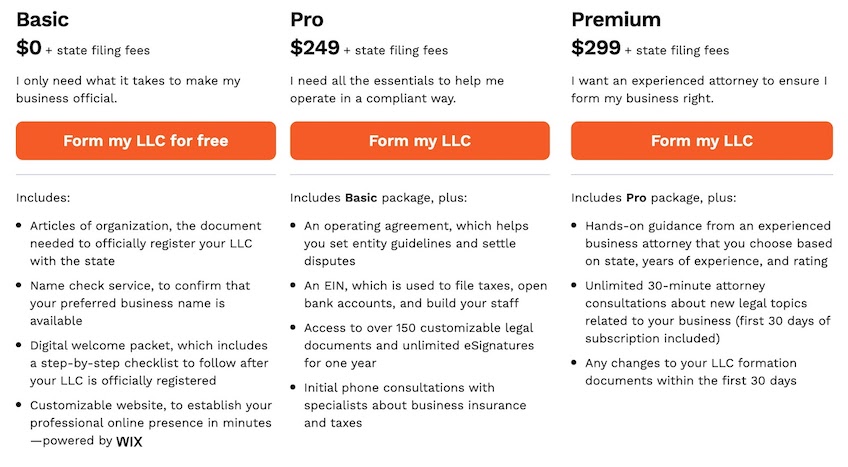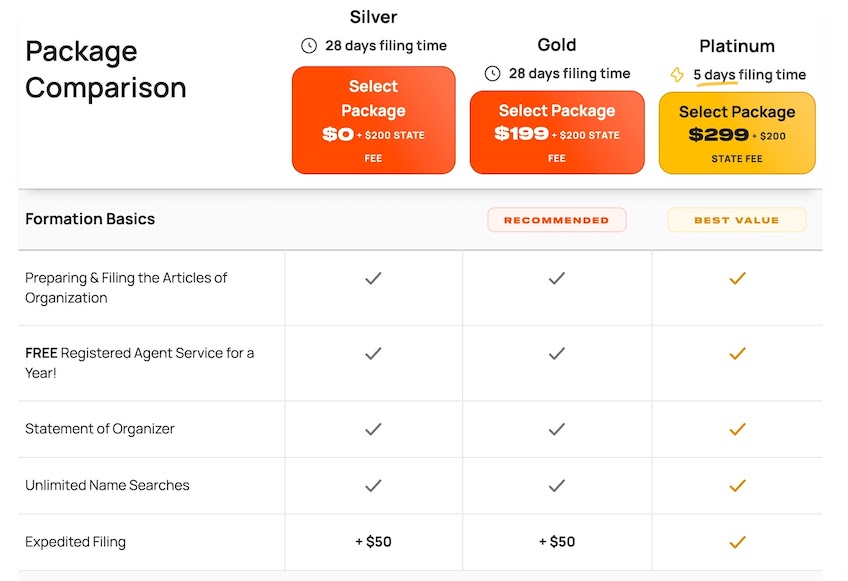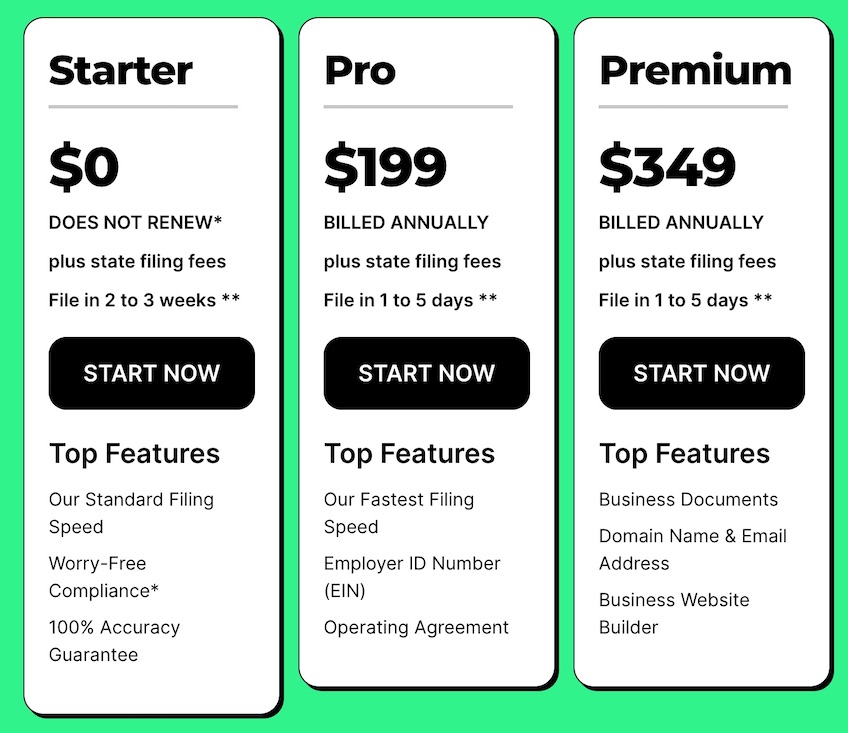Most online legal services are more hassle than help. We don’t rely on them—and we’ve tried plenty over the years.
Nearly all of them push you toward an annual subscription and hope you forget it’s on auto-renew.
There are a few options (LegalZoom, Bizee (formerly Incfile), and ZenBusiness) that can guide you through business formation. Even then, they rarely save meaningful time. If you use one, stick to the free tier and read my notes below so you don’t get fleeced by upsells.
Otherwise, you can safely ignore the broader “online legal services” category.
I do have practical tips below for getting real legal help when you actually need it.
My Experience With Attorneys and Legal Services
I’ve got plenty of first-hand experience with the legal side of running companies:
- Started multiple businesses and negotiated operating agreements across several partners.
- Put together revenue and profit-share agreements for websites doing seven figures annually.
- Ran Operations and HR for our company and for departments I’ve managed at previous companies.
- Handled cease-and-desists and lawsuit threats—always a fun fire drill.
Am I a business attorney? Absolutely not. Don’t use me for legal advice. But I do know how to work with lawyers as an entrepreneur.
Also, my long-term partner is an attorney.
It’s an unfair advantage: law school, bar passage, law-firm experience, and now in-house at Amazon.
I’ve had a front-row seat to how the industry works. When I have a legal question or need a referral, I ask her. I’m sharing what she’s taught me—plus what’s worked for us.
The Best Online Legal Services For Starting a Business
A quick warning before we dive in: services that “help” you start a business aren’t always a scam, but they’re not exactly a silver bullet either.
The main benefit is a friendly UI that walks you through steps. That’s about it.
Here’s the reality of starting an LLC and registering your business:
- Registering an LLC and getting an EIN isn’t hard. Using a service typically won’t save real time. Your EIN is free from the IRS—no one should charge you for it.
- Even with an online service, you still must complete state and sometimes local registrations. When we hired across multiple states, those steps were the real time sink. No software automates all of it. At best, you’ll get pointers on where to go. We lean on our payroll software for multi-state tax setup and compliance.
- The upsells are awful. They target people who don’t know what matters. Generic operating agreements won’t protect partners, many “templates” are low value, and “consultations” are rarely substantive. Watch for registered agent auto-renewals, “compliance” add-ons, and rush fees that don’t change outcomes.
- Avoid subscriptions. There’s no reason to pay ongoing fees after formation. If an initial one-time package gives you confidence, fine. But don’t let an annual plan linger on your card.
- Most providers advertise $0 LLC formation because they’re just completing government forms. They make money on upsells. You’ll still pay state fees (which vary widely) and anything recurring they sneak into checkout.
Alright, let’s look at individual products.
LegalZoom
LegalZoom is the category leader—ubiquitous ads, lots of social proof, and a polished flow.
The pricing isn’t great, but it’s not the worst we’ve seen:

If you’re going to use them, I strongly recommend sticking with the free plan. Paid tiers don’t add meaningful value:
- Generic operating agreements won’t cut it for multi-member LLCs. If equity is involved, each partner needs their own attorney.
- EINs are free directly from the IRS—don’t pay a middleman.
- Document templates are fine for ideas, not for protection. Have any critical doc reviewed by counsel you trust.
- Customer support isn’t legal advice. If you need real guidance, you need a real lawyer—not a call-center queue.
- For e-signatures, use a dedicated tool like DocuSign that scales with your business.
Bottom line: use LegalZoom only for a guided checklist experience—and only on the free plan.
Bizee
Their pricing is a bit buried—never a great sign.
Here it is:

It’s comparable to the rest of the field.
Expect the same upsells and the same lack of real value in paid tiers.
If you insist on using Bizee, there’s no reason to pick anything but the free plan—and decline every upsell.
ZenBusiness
We’ve used them. They’re… fine. Like the others: a free plan, a polished checklist, and little actual time savings.
Basically a guided to-do list wrapped in an account dashboard.
And like the rest, avoid the paid plans:

I really dislike how ZenBusiness nudges you into subscriptions from the start. Plenty of small businesses sign up, forget, and eat a ~$200 annual charge for nothing. Watch for registered agent renewals and “worry-free compliance” bundles you don’t need.
And their upsells add no real value. Need a site? Use a proper website builder. Need a domain? Use a true domain registrar. Need e-signatures? Use a real e-signature tool. You don’t want to unwind core tools from a formation portal as you scale.
If you’re using ZenBusiness at all, stick to the free plan and skip the add-ons.
Which Online Legal Service Will I Use for My Next Business?
None of them.
My cofounder and I have started a lot of businesses. We’ve tried every route:
- DIY, end-to-end.
- Using an online filing service.
- Hiring real attorneys for 100% of the work.
The outcomes were essentially the same. Spending more here didn’t save meaningful time.
Next time we’ll probably file directly ourselves with the state and IRS.
The exception: if you’re starting a business with partners, take the equity and operating agreement seriously. Hire a business-formation attorney who does this every day. When we formed, I retained an attorney (she was doing work for Peloton at the time) to represent me; my cofounder had his own. We combed through our agreement line by line. Worth every penny.
Don’t skimp on personal representation for partner agreements. If you ever have a serious dispute, that one document becomes everything.
Stay Away from Subscription Legal Platforms
There are platform companies with a pitch that sounds amazing:
- A low monthly fee—think $20/month.
- Direct access to legal advice.
- Call anytime for anything.
- Massive libraries of legal templates.
It sounds great.
It’s not.
Even new associates bill around $250/hour. Partners who can actually solve hard problems bill far higher. At $20/month, the only way a platform survives is with low-tier counsel and conveyor-belt work. They rely on subscribers forgetting they’re paying.
Even when these platforms broker “professional services,” I wouldn’t source counsel there. Attorney quality varies wildly. The best lawyers are at firms where the work and mentorship are strongest—it’s a hierarchical industry. A platform marketplace is a red flag.
I’ve worked with excellent attorneys at top firms and even they miss things. I don’t want to imagine the quality control on a volume platform.
Cut corners elsewhere to get your business off the ground. Don’t cut corners on legal advice.
Legal Directories Are Completely Worthless
Finding a good attorney is legitimately hard.
Online legal directories don’t fix that.
They won’t separate the great from the mediocre. Many are pay-to-play ads dressed up as “rankings.” I’ve even seen directories trying to sell annual subscriptions to readers—absurd and infuriating.
Skip the directories.
How to Find Legal Help When You Need It
Referrals win. The best source is another attorney you already trust. If you’ve done estate planning, ask that attorney for a small-business referral. Your CPA can also be a great source.
Ask other entrepreneurs in your city. If you don’t know any, attend a couple founder meetups and ask around.
Yes, it takes time and it’s annoying. It’s also the only reliable way to find quality counsel.
Once you find one good lawyer, they can usually refer you to specialists as new needs pop up. Most attorneys practice in the state where they’re barred and tend to know the local ecosystem well. Competent attorneys recognize competence fast—you only need to start from scratch once.
I’m lucky—I can just ask my partner if she has a referral. It’s a cheat code for navigating the legal world.
Look for a boutique firm that focuses on small businesses in your city. If you’re in a regulated space (healthcare, finance, etc.), find a firm that lives in that niche. Big-firm partners won’t answer a brand-new company’s emails—and that’s okay. Early on, you can’t give them enough work to be interesting.
A boutique will take your call—and take your work seriously.
The Inherent Problem with a Nationwide Online Legal Service
The U.S. legal landscape is insanely fragmented. Competent counsel must track federal, state, city, and even county rules. Managing that for clients in one metro is a lot. Rules conflict, change constantly, and new regulations are often vague until case law or guidance clarifies them.
Multiply that by 50 states, 19,495 cities and towns, and 3,143 counties. It’s… a lot.
We run a remote company with employees across the U.S. Keeping up with employment laws, registrations, and taxes is a full-time job. At times, getting straight answers on Washington State taxes alone has been a project.
Bottom line: legal work is inherently local. If you want it done right, hire someone who actually knows the rules where you live and operate. No one “national service” can know everything, everywhere, all at once.
So “online legal service” is mostly a misnomer. Beyond simple filings like LLC formation, it doesn’t map to how law is practiced.
Yes, big companies hire national or global firms. They also pay enormous fees to throw an army of associates at problems and figure things out on the fly. They solve it with bodies and money.
Most of us aren’t paying multi-million-dollar retainers.
Even for something “simple” like estate planning, find a local attorney. They’ll start with strong templates, customize based on your situation, and ensure everything aligns with local requirements. That’s what matters.
